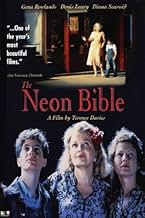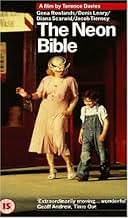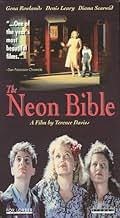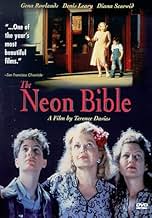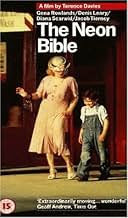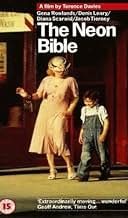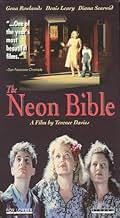Agrega una trama en tu idiomaWhile on a train, a teenage boy thinks about his life and the flamboyant aunt whose friendship acted as an emotional shield from his troubled family. This film evokes the haunting quality of... Leer todoWhile on a train, a teenage boy thinks about his life and the flamboyant aunt whose friendship acted as an emotional shield from his troubled family. This film evokes the haunting quality of memory while creating a heartfelt portrait of a boy's life in a rural 1940s Southern town... Leer todoWhile on a train, a teenage boy thinks about his life and the flamboyant aunt whose friendship acted as an emotional shield from his troubled family. This film evokes the haunting quality of memory while creating a heartfelt portrait of a boy's life in a rural 1940s Southern town.
- Dirección
- Guionistas
- Elenco
- Premios
- 1 premio ganado y 2 nominaciones en total
- Dirección
- Guionistas
- Todo el elenco y el equipo
- Producción, taquilla y más en IMDbPro
Opiniones destacadas
But this is horrifically off the mark.
The review of Davies' version of Edith Wharton's *House of Mirth* in the NY Times said that the movie was more like Charles Dickens than Edith Wharton. Which is exactly the criticism I had of this movie. These folks are not embodying American Southern farmers, they're acting like industrial working class people. I can understand and be sympathetic to the original story: my people, coming from South Carolina & Georgia, had lives very similar to the plot of this movie. Therefore, I could see where this could potentially be a very good film.
But nothing gets under my skin like an inability to see beyond one's own cultural bias...which is the major mistake of the director of this production. If you take the emotions, the gestures, the imagery of this film and put them in an industrial landscape, it would be an OK movie. But having people interact and react this way and have them being farmers in the Deep South is bogus, phony and w-a-y off the mark. If you want to see true southern Americana, skip this movie and see Elia Kazan's *Wild River* instead...
The problem lies entirely at the feet of director Terence Davies . He directs in a poetic style or at least attempts to but where as a poetic film by Terewnce Malik or Sam Mendes works here it spectacular fails . . What sinks the film is the unnatural framing where a character is smack bang in the middle of the screen facing the camera . A lot of critics complain that a director like Danny Boyle shoots , frames and edits films in a similar manner but at least he brings a sense of variety to his movies . Here however Davies relies on the exact same framing technique throughout the entire film which sinks it as a cinematic presentation and feels more like a filmed theater play
Edward Guthmann said the film was poorly received when it premiered at Cannes, but called it "gorgeous" and "one of the year's most beautiful films." He said it was a rewarding film that requires a little faith from the viewer due to long, slow, "lingering shots that work as a kind of meditation." He described the revival meeting at night "like an Edward Hopper or Thomas Hart Benton painting come to life." I will grant the film that it looks beautiful, but it lacks a deeper substance which would be necessary to make this a great film.
Director Terence Davies said "The Neon Bible doesn't work, and that's entirely my fault. The only thing I can say is that it's a transition work. And I couldn't have done The House of Mirth without it." I appreciate that he is humble enough to admit this is not his best work. Again, the film looks brilliant, so it's far from a complete failure. And you have to respect the brave casting decision that brought Denis Leary, not known for his subtle acting, on board.
But after reading his fabulous Sight and Sound list choices, I decided to try another film of his once again -- in a more obscurer note, the Neon Bible. Adapted from the writer of the Confederates of Dunces, it tells the story of a troubled child in Nowhere, USA as he try to navigate his complicated family life, whilst intertwined with the South. Once her loving aunt decides to leave after a better opportunity arises, he reaches a rough decision that would change his life forever.
I was really shocked how much I love this film. It is just awe-inducing how well stylized it was and how the story just felt right even its much maligned fever pitch of a climax. I do not know, something about that climax worked for me. Its a clearly heightened depiction of growing up but I love how bizarre it was. It heightened the emotions of the film, which by then was pretty much subdued for most of the film. It also is an effective Americana (even though Davies is British) that works for its unabashed bluntness of how it depicts the South, grits and all.
Overall, a great film. [5/5]
¿Sabías que…?
- TriviaIn an interview with "Time Out Film", Terence Davies said about this film, "[It] doesn't work, and that's entirely my fault. The only thing I can say is that it's a transition work. And I couldn't have done La casa de la alegría (2000) without it."
- Citas
David, aged 15: If you were different from anybody else in town, you had to get out. They used to say in school, "you have to think for yourself," but you couldn't do that in town. You have to think what your father thought and that was what everybody thought.
- ConexionesFeatured in Fandor: Cannes You Dig It? | Fandor Spotlight (2022)
- Bandas sonorasOh Lord, How Long?
Traditional
Selecciones populares
- How long is The Neon Bible?Con tecnología de Alexa
Detalles
Taquilla
- Total en EE. UU. y Canadá
- USD 78,072
- Fin de semana de estreno en EE. UU. y Canadá
- USD 5,045
- 3 mar 1996
- Total a nivel mundial
- USD 78,072
- Tiempo de ejecución
- 1h 31min(91 min)
- Color
- Mezcla de sonido
- Relación de aspecto
- 2.35 : 1

